|
CONTENTS
International Matters of Concern
• Trudeau Government's Foreign Policy Priorities as
Revealed in Foreign Minister's Mandate Letter - Margaret Villamizar -
• Measures to Establish New World Order to Oppose
U.S. "Rules-Based" Order - Pauline Easton -
• Growing Challenge to U.S. Dominance of Global Finance - K.C. Adams - • U.S. Pushes Hegemonic Policy in Wake of Humiliating
Defeat in Afghanistan - Steve Rutchinski -
• U.S. Ramps Up Anti-China Rhetoric - Nick Lin and Philip Fernandez -
International Matters of Concern
- Margaret Villamizar -

Prime
Minister Trudeau issued his “mandate letters” to the 38
Members of his Cabinet on December 16, almost a month after the 44th
Parliament opened on November 22.
According to the Prime Minister's Office (PMO), these mandate
letters "outline the objectives that each minister will work to
accomplish, as well as the pressing challenges they will address in
their role." The PMO says the publicly available letters "help
Canadians hold the government to account" by giving them a clear idea
of how the government will deliver its agenda.
All the letters start off saying that finishing the fight against
the pandemic remains the government's central focus and make mention of
other issues the Liberals campaigned on in the election. They begin by
outlining what are said to be the overarching priorities of the
government and the expectations of each minister for the parliamentary
session, followed by specific directives on the key work and priorities
for their individual portfolios, including that they come up with a
plan to implement those directives. They are indicative of what the
government is up to as much for what they say as for what they leave
out.
Mélanie Joly is the Trudeau government's fourth Minister of
Foreign Affairs since the 2015 election when it replaced
the Harper Conservatives. Mandate letters given to the Liberal
government's first two foreign ministers, Stéphane Dion (2015)
and Chrystia Freeland (2017) established as the first priority
recognition of the U.S. as Canada's "closest ally and most important
economic and security partner." The specific instruction to
Stéphane Dion, ostensibly to repair damage done to this
all-important relationship by Harper, was to "improve relations with
the United States" as well as to "strengthen North American trilateral
cooperation."
Chrystia Freeland, who worked as a journalist based in the U.S. for
years before returning to Canada to run for the Liberals in a 2013
by-election, replaced Dion when renegotiating NAFTA became the burning
issue after the election of Donald Trump as U.S. President in 2016. She
was instructed to "maintain constructive relations with the United
States" and "lead efforts to deepen trade and commerce relations" with
it.
Freeland was replaced after the September 2019 election by
François-Philippe Champagne whose appointment coincided with the
launch of the Trudeau government's campaign for a seat on the UN
Security Council. The mandate letter he received framed his role as one
of "advancing Canada's national interests in a more unpredictable world
and leading Canada's contribution to address fundamental global
challenges." The priority placed on advancing Canada's relationship
with the U.S. in the two previous foreign minister's mandate letters
was for all intents and purposes disappeared, the only direct reference
to it showing up last on the list, almost as an afterthought, telling
the minister to "Support the Deputy Prime Minister and Minister of
Intergovernmental Affairs in work on Canada-U.S. Relations."
Canada's bid for the Security Council seat was unsuccessful in June
2020 when the facts of what Canada was up to internationally told a
very different story than Champagne's mandate
letter was crafted to suggest. Now the veil has come off in the
marching orders given to Trudeau's fourth foreign affairs minister,
Mélanie Joly.
Foreign Affairs Minister's Mandate Letter
The priorities Global Affairs Canada is to uphold are contained in
the mandate letter which instructs the foreign minister to concern
herself with "promot[ing] peace and security, combat[ing]
authoritarianism and counter[ing] foreign interference through
collective international responses, including by expanding our
cooperation with like-minded partners and Canadian, international and
multilateral organizations." This puts Canada almost exclusively at the
service of the U.S. agenda of interference, aggression and war under
the pretext of combating "authoritarianism."
"Authoritarianism" is said to be represented primarily by China and
Russia, but also by the leaders of other countries, no matter how
small, who are said to threaten democracy and human rights around the
world by refusing to allow the U.S., Canada and certain European powers
to force liberal "representative democracy" on them.
Joly's mandate letter makes clear that in the name of high-sounding
ideals like democracy and human rights, what Canada has agreed to do is
step up its role as good cop to the U.S.
bad cop. It has taken on the job of trying to sell those rotten wares
as standing up for the interests and values of Canadians.
 Fully
18 of 26 priorities Joly is instructed to act on are explicitly or
implicitly associated with longstanding U.S. foreign policy objectives
and projects in furtherance of its aim of global dominance, with
"multinational" entities like NATO, the G7 and a bevy of coalitions,
institutes, foundations, NGOs and the like as tools for this. Some of
the interfering "democracy promotion" outfits Canada has committed to
lead and fund in the coming year were spelled out in the Trudeau
government's submission to Biden’s Summit for Democracy in
December. Fully
18 of 26 priorities Joly is instructed to act on are explicitly or
implicitly associated with longstanding U.S. foreign policy objectives
and projects in furtherance of its aim of global dominance, with
"multinational" entities like NATO, the G7 and a bevy of coalitions,
institutes, foundations, NGOs and the like as tools for this. Some of
the interfering "democracy promotion" outfits Canada has committed to
lead and fund in the coming year were spelled out in the Trudeau
government's submission to Biden’s Summit for Democracy in
December.
It is understood that along with the objectives of U.S. foreign
policy, even as its ruling circles get closer to embroiling the country
in civil war, a price will be extracted from any countries the U.S.
deems to represent a "threat" to the realization of its aims.
Everything from sanctions, "lawfare" or judicial persecution, through
to full blown regime change operations, war and destruction are
included in its arsenal for that purpose, with allies like Canada
pressed to participate in meting out whatever punishment is brought to
bear on those targeted.
The very first thing on the list of priorities Trudeau has given
Joly to act on is to "Work with me, and in close collaboration with
other ministers, to further strengthen our partnership
with our closest ally, the United States." This is followed by such
things as:
- Facilitate the safe passage and resettlement of vulnerable people
from Afghanistan, with an emphasis on individuals who supported Canada
and its NATO allies over the past two decades
- Develop and launch a comprehensive Indo-Pacific strategy to deepen
diplomatic, economic and defence partnerships and international
assistance in the region
- Work with G7, NATO and like-minded partners to develop and expand
collective responses to arbitrary detention, economic coercion, cyber
threats, foreign interference in democratic
processes and egregious violations of human rights, including through
the use of sanctions
- Advance support for democracy and human rights as a core priority in Canada's international engagement, including by:
1. Establish[ing] a Canadian centre to expand the availability of
Canadian expertise and assistance to those seeking to build peace,
advance justice, promote human rights, inclusion and
democracy, and deliver good governance
2. Working with international partners to help establish an
International Anti-Corruption Court, to prevent corrupt officials and
authoritarian governments from impeding development
that should benefit their citizens
3. Expanding fast and flexible support for fragile and emerging
democracies, increasing Canada's diplomatic presence in regions of
strategic importance
4. Continuing to support
and
implement Canada's Magnitsky Law, the Justice
for Victims of Corrupt Foreign Officials Act [a carbon
copy of the U.S.
Magnitsky Act -- Ed note], and promote the adoption of
similar legislation
and practices globally.
- Work to strengthen Canada's engagement and presence in the United
Nations (UN) system in order to ensure a more effective, efficient,
relevant and accountable UN that supports a
rules-based international system, particularly so that it can better
address those who are seeking to undermine democracy, human rights and
the rule of law.
- Expand Canada's engagement with allies, partners and international organizations in order to promote peace and security
- Work with the Minister of National Defence, the Minister of Northern Affairs and partners to defend Arctic sovereignty
- Work with the Minister of National Defence and NATO partners to
establish a new NATO Centre of Excellence on Climate and Security based
in Canada to ensure Canada and its
allies are prepared to respond to climate-related threats and
emergencies.
- Work with the Minister of Housing and Diversity and Inclusion to
support the Special Envoy on Preserving Holocaust Remembrance and
Combating Antisemitism [the Special Envoy is a Zionist who promotes the
controversial International Holocaust Remembrance Alliance (IHRA)
definition of anti-Semitism the Trudeau government has adopted. This
bogus definition equates defence of Palestinian rights and criticism of
Israel with "anti-Semitism" -- Ed note] in advancing their mandate.
Like with their failed attempt to win a seat on the UN Security
Council where the position would have been used to undermine the
authority of the UN Charter and the rule of law by pushing its
replacement with the U.S. "rules-based international order," the
Trudeau Liberals now aim to hoodwink Canadians into believing that serving as a front
man for U.S.-style "democracy promotion" schemes to meddle in the
affairs of sovereign nations and peoples has anything to do with their
values or to contributing to human rights, the rights of women and
girls, or to peace and security around the world. A government which is
not seen to do these things at home can hardly be expected to defend
them abroad.
 What
is unmistakable in considering the foreign minister's mandate letter is
that Canadians have no say in deciding what role their country should
play in the world. All matters of Canada's foreign policy remain the
purview of an executive operating behind closed doors and away from
Parliament, at the beck and call of the U.S. and supranational bodies
ruled by narrow private interests. None of what the letter pertains to
was raised by the Liberals, any of the other cartel parties in the
Parliament or the monopoly media during the election campaign, which
was notably devoid of any discussion on foreign policy whatsoever
except that raised by the Marxist-Leninist Party of Canada and other
small parties. What
is unmistakable in considering the foreign minister's mandate letter is
that Canadians have no say in deciding what role their country should
play in the world. All matters of Canada's foreign policy remain the
purview of an executive operating behind closed doors and away from
Parliament, at the beck and call of the U.S. and supranational bodies
ruled by narrow private interests. None of what the letter pertains to
was raised by the Liberals, any of the other cartel parties in the
Parliament or the monopoly media during the election campaign, which
was notably devoid of any discussion on foreign policy whatsoever
except that raised by the Marxist-Leninist Party of Canada and other
small parties.
Like all matters which affect the lives of the people who comprise
the country called Canada, the aim of its foreign policy must be set by
the people themselves to further the cause of peace, freedom and
democracy worldwide. Canada must contribute to upholding the rule of
law internationally as contained in the Charter of the United Nations,
stop interfering in the internal affairs of sovereign countries in the
name of a fraudulent rendering of the values of Canadians and make
Canada a zone for peace by getting out of NATO and NORAD as a first
step. 
- Pauline Easton - 
Peoples of the world
demand action at COP26 in Glasgow, November 5, 2021.
As 2021 came to an end, a matter of grave concern for the peoples of
the world has been the inability of the United Nations to exert
authority in matters of the relations between countries based on the
principles enshrined by the UN Charter. There is a lot of talk about
"strategic relations" and "strategic partnerships" and interpretations
of the kind of new world order the world requires. Everyone
is coming up with different formulations around strategic partnerships,
relations and strategy. According to some, the U.S. "rules-based
international order" is the basis for a "strategic paradigm" which
gives structure to "strategic thinking." Such thinking is different
than having a policy objective. For their part, statements by both
China and Russia on strategic partnership and that of the European
Union (EU) on "Strategic Autonomy" talk about strategy in relation to
some type of world order. The Chinese and Russians are saying it is a
"new era," but how that is defined is as yet not clear. China-Russia
Strategic Partnership While the U.S. and
countries such as Canada talk nonstop about establishing a "rules-based
international order," where the U.S. sets the rules and decides who is
and who is not breaking them, a significant development in 2021 was the
announcement by China and Russia that they have extended the
China-Russia Friendship Treaty which upholds the international rule of
law as it is enshrined in the Charter of the United Nations.[1]
The current five-year pact is a continuation of the 20-year
friendship treaty they signed in 2001. The Treaty outlines their notion
of "strategic partnership" which they say is based on the UN Charter
and international law. As one report put it, their friendship is to
"develop a comprehensive strategic partnership of coordination for a
new era in a bid to take bilateral ties to a higher level and better
benefit the peoples of the two countries and the world as well."[2]
They say they are developing relations that are going to be
neither a military nor an economic bloc against anyone else, but rather
focus on a "strategy of a new type." The Treaty and agreements are not
in the form of them being allies, in the sense of military or political
allies such as were established previously during the Cold War. The
Treaty and its extension are going beyond this old way of having
relationships, they say. The relations are also very different from
what the U.S. is promoting under its "rules-based international order"
in which everyone is to submit to the U.S. as the indispensable leader.
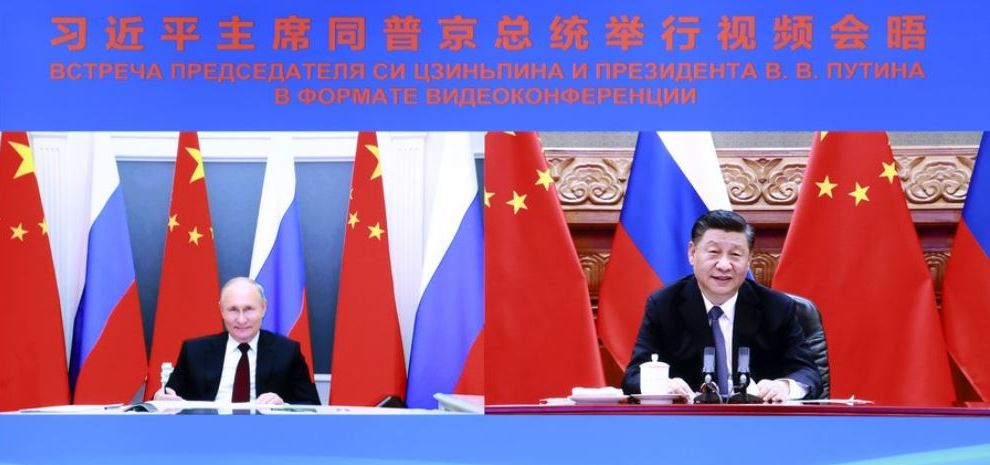
Chinese
President Xi Jinping and Russian President Vladimir Putin jointly
announced the extension of the China-Russia Treaty of
Good-Neighborliness and Friendly Cooperation,
June 28, 2021.
European Strategic Autonomy For its
part, the EU has been pursuing what it calls "European
Strategic Autonomy." At a time China and Russia are addressing
developments for Eurasia, the EU does not want to be left out. At the
same time, the autonomy that the EU is referring to is not that of
Germany or France, but of the EU which then raises the problem of the
existence of NATO and its relationship with many of the European
countries. The conception does nonetheless attempt to provide a
rationalization for the EU having their own defence force within the
ambit of the proposal to establish a "Global Concert of Powers," some
forces in the U.S. are promoting. This Global Concert of Powers
includes the EU -- not Germany or France -- along with Russia, China,
India and Japan.[3][4]
There is concern expressed by the U.S. about the continuing and
developing partnership between China and Russia in a manner which does
not accord with its own conception of a tri-polar world -- a world as
advocated by former U.S. President Trump in which the U.S. was to play
Russia and China off of one another while it set the rules to which
everyone must submit. The promotion of the U.S. "rules-based
international order " notwithstanding, there is considerable confusion
and incoherence at all levels of the U.S. government in terms of
foreign policy. The Role of Secrecy What
is known is that their policy-making is based on secrecy. The claims
being made around cyber warfare and cyber attacks, for example, and
U.S. attributions of such to Russia or China, cannot be confirmed with
evidence. It is not possible to attribute specific attacks to, say,
China, given how readily the attacks can be made to appear to be coming
from a certain place or to be initiated by this or that specific force
when there is no evidence of this, as various examples have shown. The
U.S. repeatedly simply claims it "looks like" something Putin or the
Chinese would do; it "appears as if" it is done by them, and so forth.
There is no evidence to back up these claims. The
U.S. is trying to impose a norm for what is and is not cyber warfare by
providing their claims with a legality; as something valid in terms of
law. It is similar to what they did with nuclear weapons by claiming
the information to build a nuclear bomb was secret and then claiming
that there was espionage. When Russia and China
raise in their partnership agreement that it is a new era, they are
in part saying there has to be a different world order now. On the part
of the U.S., its determination to push the scenario for a major war now
is to prevent the loss of the existing world order in which the U.S.
dominates. Notes 1. China-Russia Friendship
Treaty, Article I: "In
accordance with universally recognized principles and norms of
international laws and on the basis of the Five Principles of mutual
respect of state sovereignty and territorial integrity, mutual
non-aggression, mutual non-interference in each other's internal
affairs, equality and mutual benefit and peaceful co-existence, the
contracting parties shall develop the strategic cooperative partnership
of good-neighbourliness, friendship and cooperation and equality and
trust between the two countries from a long-term view and in a
comprehensive manner." For
the full text of the Treaty, click
here. 2. An
example of how relations for a new era are talked about is found in "China,
Russia agree to upgrade relations for new era," Xinhua, June 6, 2019.
3. "A
Crisis-Ridden Alliance Holds Crisis-Ridden Summit" by Pauline Easton, TML Monthly, June
11, 2021.
4. "U.S.
Imperialist Proposal to Resuscitate a 'Concert of Powers' to Further
U.S. Striving for Domination" by Kathleen Chandler, TML Monthly, June
11, 2021. 
- K.C. Adams - 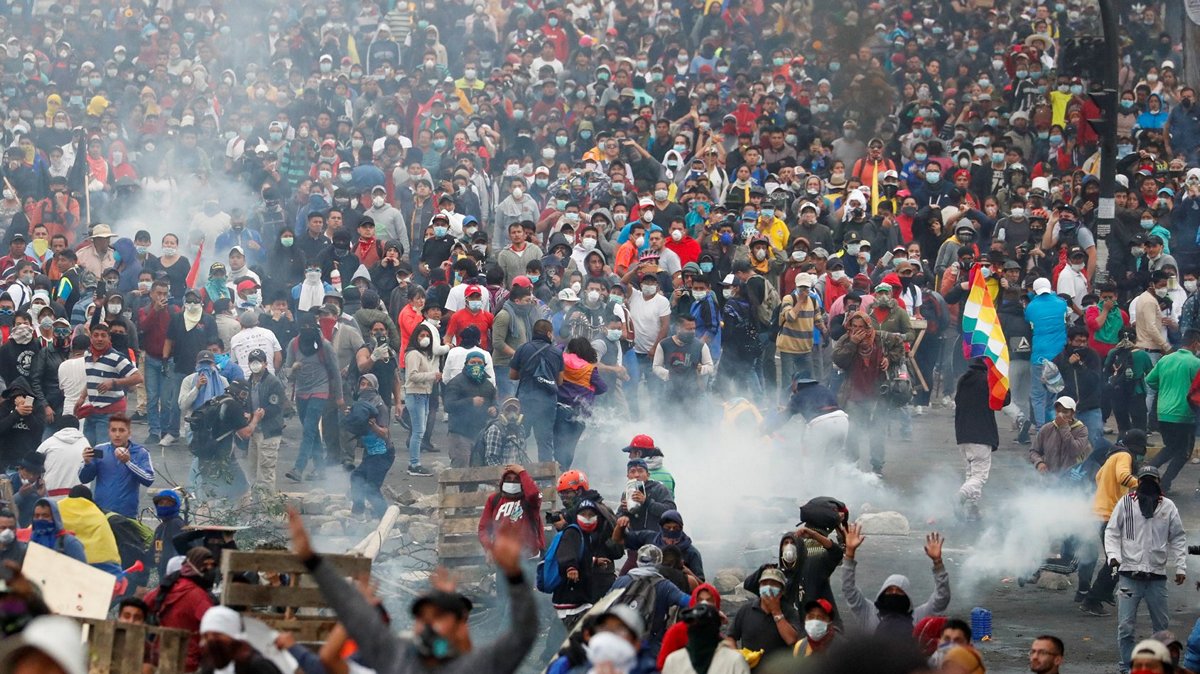
Mass actions in Ecuador
against International Monetary Fund imposed reforms,
October 14, 2019.
An area of contention in the
world today is U.S. dominance of global finance and its use of
institutions to ensnare countries within their grasp. Russia and China
have now agreed to establish a new shared international financial
framework so as to make sure the U.S. can no longer control their
trading relations or interfere in their internal affairs by imposing
sanctions. 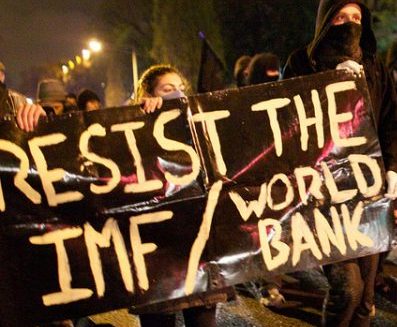 The U.S. controls
and uses the World Bank and Asian Development Bank, the International
Monetary Fund, the Bank for International Settlements and SWIFT system,
credit cards and the U.S. dollar as weapons to dominate others and
ensure its global hegemony.[1][2] The U.S. controls
and uses the World Bank and Asian Development Bank, the International
Monetary Fund, the Bank for International Settlements and SWIFT system,
credit cards and the U.S. dollar as weapons to dominate others and
ensure its global hegemony.[1][2]
Glenn Diesen, a professor at the University of South-Eastern
Norway and an editor at the journal Russia in Global Affairs,
recently penned an article published in RT, which notes: "China
and Russia have been gradually moving towards such an arrangement since
the Global Financial Crisis of 2008 revealed the risks of excessive
reliance on the U.S. However, American economic sanctions against both
Moscow and Beijing appear to have intensified the search for
alternatives." Diesen details the immense power of
what he calls "the American-centric financial architecture." He writes,
"Most international trade is conducted in U.S. dollars, the transfer of
payments goes through the SWIFT transaction system in which the country
has immense sway, while financing derives from U.S.-led investment
banks, debt is ranked by U.S. rating agencies, and even the main credit
cards are American. These economic instruments of power enable
Washington to run an empire -- it can manage huge trade deficits,
collect data on its adversaries, give favourable treatment to allies,
and crush its adversaries with sanctions." Diesen
contends, "The U.S.-centric financial architecture is no longer
sustainable. The White House has lost control over its negative trade
imbalance, debt is spiralling out of control, and rampant inflation is
destroying the currency." 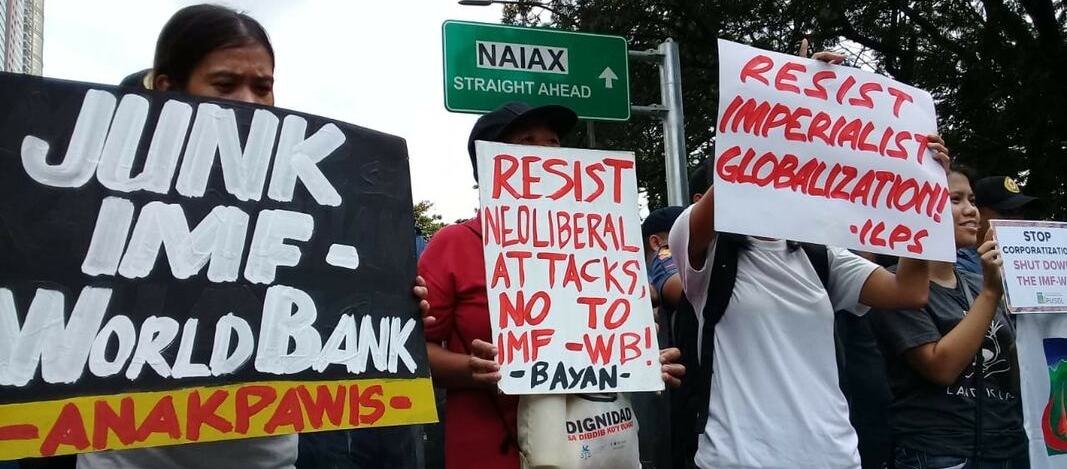
Within the
situation Diesen says the foundations for the role of the U.S. dollar
as the international reserve currency and to settle global trade and
accounts "are quickly coming to an end." He writes: "A
financial partnership between China and Russia, the world's largest
energy importer and the world's largest energy exporter, is an
indispensable instrument for dethroning the petrodollar. In 2015,
approximately 90 per cent of trade between Russia and China was settled
in dollars, and by 2020, dollar-denominated trade between the two
Eurasian giants had almost reduced by half, with only 46 per cent of
trade in dollars. Russia has also been leading the way in cutting the
share of U.S. dollars in its foreign reserves. The mechanisms for
de-dollarizing China-Russia trade are also used to end the use of the
greenback with third parties -- with advancements being seen in places
such as Latin America, Turkey, Iran, India, etc." Diesen
explains, "The SWIFT system for financial transactions between banks
worldwide was previously the only system for international payments.
This central role for SWIFT began to erode when the U.S. used it as a
political weapon. The Americans first expelled Iran and north Korea,
and in 2014, Washington began threatening to expel Russia from the
system as well. Over the past few weeks, the threat of using SWIFT as a
weapon against Russia has intensified." In the face
of these attacks and threats, China, Russia and several European
countries have created alternatives to SWIFT. Using these alternate
financial institutions, countries have been able to some extent, as
Diesen says, "to curb Washington's extra-territorial jurisdiction and
thus continue trading with Iran. A new China-Russia financial
architecture should integrate [the Chinese system] CIPS and [Russian]
SPFS, and make them more available to third parties. If the U.S. expels
Russia, then the decoupling from SWIFT would intensify further."[3]
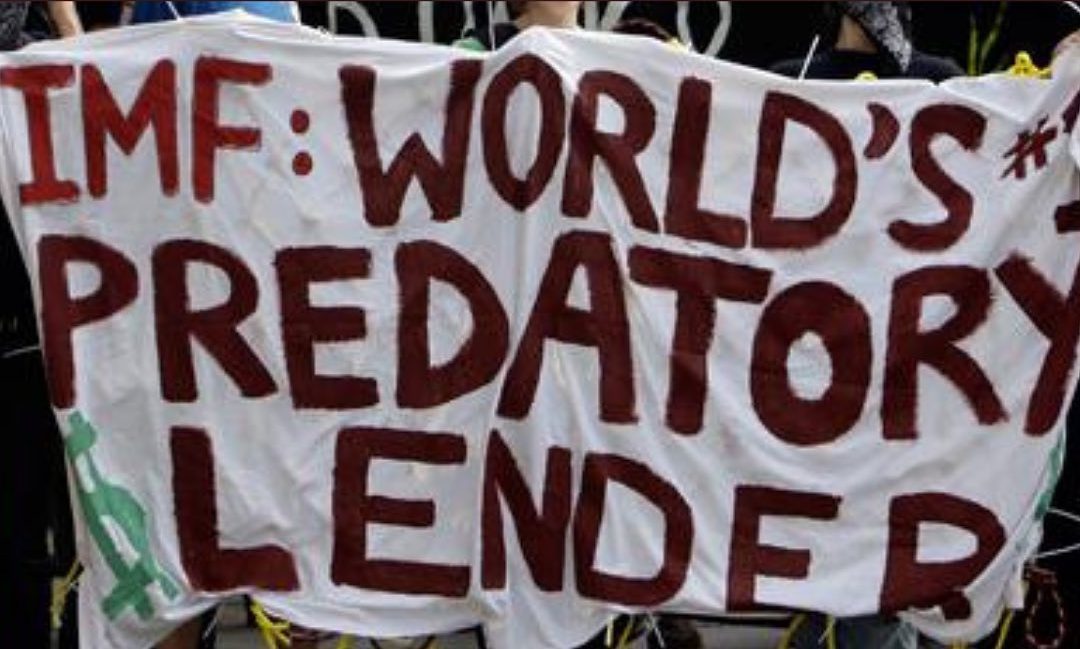 Diesen details
the rising opposition to the U.S.-controlled development banks and
other lending institutions writing, "The U.S.-led IMF, World Bank and
Asian Development Bank are renowned instruments of U.S. economic
statecraft. The launch of the Chinese-led Asian Infrastructure
Investment Bank (AIIB) in 2015 became a watershed moment in the global
financial architecture, as all the major allies of the U.S. (except
Japan) signed up in defiance of American warnings. The New Development
Bank, formerly referred to as the BRICS Development Bank, was a further
step towards decoupling from the U.S.-led development banks. The
Eurasian Development Bank and future SCO Development Bank are more
nails in the coffin of U.S.-controlled development banks." Diesen details
the rising opposition to the U.S.-controlled development banks and
other lending institutions writing, "The U.S.-led IMF, World Bank and
Asian Development Bank are renowned instruments of U.S. economic
statecraft. The launch of the Chinese-led Asian Infrastructure
Investment Bank (AIIB) in 2015 became a watershed moment in the global
financial architecture, as all the major allies of the U.S. (except
Japan) signed up in defiance of American warnings. The New Development
Bank, formerly referred to as the BRICS Development Bank, was a further
step towards decoupling from the U.S.-led development banks. The
Eurasian Development Bank and future SCO Development Bank are more
nails in the coffin of U.S.-controlled development banks."
The
contention has reached into other financial areas with China and Russia
developing their own rating agencies and replacing the dominant
position of Visa and Mastercard in their respective countries with
their own credit cards such as the Chinese company UnionPay's credit
cards and non-currency payment systems including the widely used
Chinese mobile platform Alipay. "Furthermore,"
Diesen writes, "China and Russia seek to avoid U.S.-dominated
transportation corridors. China has invested trillions of dollars into
its Belt and Road Initiative for new land and sea corridors, while
Russia has advanced a similar but more modest program that includes
developing the Arctic as a maritime route in partnership with China."
Diesen concludes: "The U.S. can use more sanctions to oppose
the development of a multipolar international financial architecture,
although continued economic coercion will only increase the demand for
decoupling from America. The first rule of sanctions is that when they
are enduring, the targets of sanctions will learn to live without the
belligerent power. What began as an effort to weaken and isolate
Washington's adversaries eventually ends up isolating the U.S."
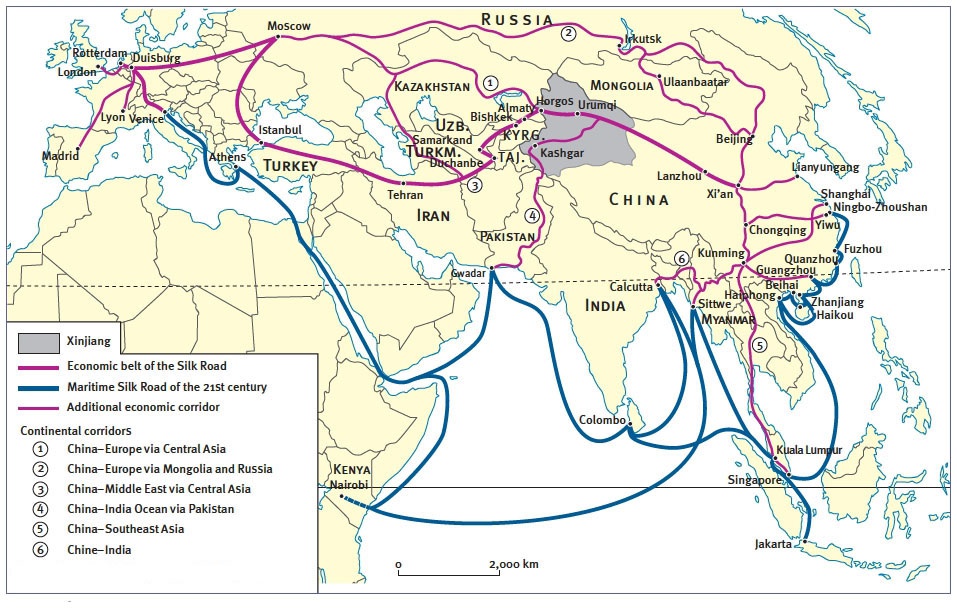
China's Belt and
Road Initiative (click
to enlarge) Notes 1. Excerpts from "How
the SWIFT System Works," by Shobhit Seth follow:
"[...] Behind most international money and
security transfers is the Society for Worldwide Interbank Financial
Telecommunications (SWIFT) system. SWIFT is a vast messaging network
used by banks and other financial institutions to quickly, accurately,
and securely send and receive information, such as money transfer
instructions. "More than
11,000 SWIFT member institutions sent over 35 million transactions per
day through the network in 2020. The organization recorded an average
of 42.5 million messages per day on a year-to-date basis in March 2021.
Traffic grew by 9.8 per cent compared to the same period of the
previous year. [...] "This
payment network allows individuals and businesses to take electronic or
card payments even if the customer or vendor uses a different bank than
the payee. "SWIFT works
by assigning each member institution a unique ID code that identifies
not only the bank name but country, city, and branch."
For the full item click
here. 2. The Wikipedia
article "Society for Worldwide Interbank Financial Telecommunication"
explains: "[SWIFT] sends
payment orders, which must be settled by correspondent accounts that
the institutions have with each other. To exchange banking
transactions, each financial institution must have a banking
relationship by either being legally organized as a bank or through its
affiliation with at least one bank. While SWIFT transports financial
messages in a highly secure manner, it does not hold accounts for its
members nor perform any form of clearing or settlement.
"As of 2018, around half of all high-value
cross-border payments worldwide used the SWIFT network, and in 2015,
SWIFT linked more than 11,000 financial institutions in over 200
countries and territories, who were exchanging an average of over 32
million messages per day (compared to an average of 2.4 million daily
messages in 1995). "Though
widely utilized, SWIFT has been criticized for its inefficiency. [...]
SWIFT has also attracted controversy for enabling the United States
government to monitor, and in some cases interfere with, intra-European
transactions." 3. Below are excerpts from the
article "Kremlin reveals new independent Russian-Chinese financial
systems," by Layla Guest, published by RT on December 15, 2021:
"Russia and China will develop shared financial
structures to enable them to deepen economic ties in a way that foreign
states will be unable to influence, the Kremlin has announced following
talks between the countries' leaders. "The
move appears to be a response to a series of warnings that Western
nations could push to disconnect Russia from the Brussels-based SWIFT
financial system as a form of sanctions. "...
During the talks..., Russian President Vladimir Putin and his Chinese
counterpart Xi Jinping called for increasing the share of national
currencies in mutual settlements and expanding cooperation to provide
Russian and Chinese investors with access to stock markets, said Yuri
Ushakov, Putin's foreign policy advisor. "Ushakov
said 'particular attention was paid to the need to intensify
efforts to form an independent financial infrastructure to service
trade operations between Russia and China.'
"'We mean creating an infrastructure
that cannot be influenced by third countries,' the Kremlin
aide added. [...] "Both
Russia and China are said to be increasingly looking to move away from
using the U.S. dollar as the main currency of international trade,
instead using their own denominations to underpin the booming volume of
Moscow-Beijing trade. "[At
a December 7 hearing before the Senate Committee on Foreign Relations,]
U.S. Under Secretary of State Victoria Nuland said that the White
House, along with a number of Western European nations, was mulling
completely isolating Moscow from the global financial system should
Russian troops dare to invade Ukraine. "Just
the day before, Bloomberg had suggested that Washington could target
the country's major banks and even disconnect Moscow from the SWIFT
network. "At the end of
November, the boss of Russia's state-run oil giant Rosneft, Igor
Sechin, accused Washington of manipulating the dollar to further its
own interests and said the currency was losing its appeal due to the
U.S. Federal Reserve's policy of quantitative easing -- essentially
flooding the global economy with an excess supply of money.
"Earlier this year, Russian Foreign Minister
Sergey Lavrov suggested that Beijing and Washington 'need to
move away from the use of Western-controlled international payment
systems.' The top diplomat also accused the U.S. of seeking 'to
limit the technological development opportunities of both the Russian
Federation and the People's Republic of China.'" [The
sanctions against using the Chinese company Huawei's products are a
case in point. The attacks include the arrest of its Chief Financial
Officer Meng Wanzhou in Vancouver at the behest of the U.S.
authorities, where she was held under house arrest for three years. --
TML Ed. Note] 
- Steve Rutchinski - The
U.S. rout and humiliation in Afghanistan, besides other things,
seriously undermined confidence in the U.S. as a "reliable partner." As
the U.S. scrambled to save itself, it abandoned all its NATO "partners"
as well as collaborators, to fend for themselves. The
U.S. started emphasizing plans to focus on the Indo-Pacific region,
including efforts to integrate countries there into the U.S. military
and financial machinery. U.S. Vice-President Kamala Harris visited
Singapore and Vietnam the week of August 23. It was her second
international trip, having visited Guatemala and Mexico previously as
part of contending with immigration issues. Part of the trip then was
to direct considerable fire against China, engaging in a brinkmanship
that is dangerous for all concerned. Conditions of humiliation and
desperation drive thirst for revenge to the brink of war. 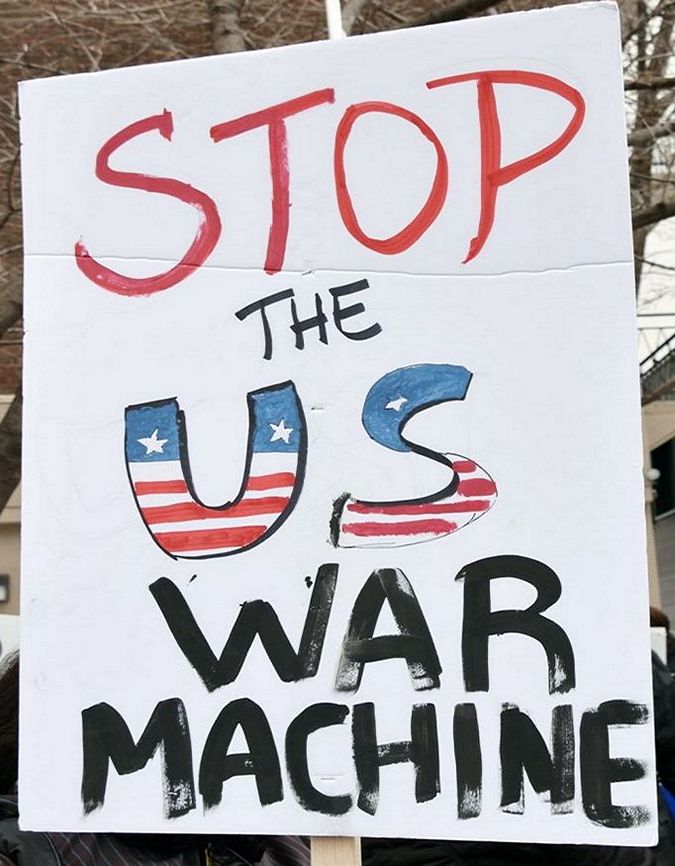 Stopping in
Singapore first, Harris met with Singaporean President Halimah Yacob and
Prime Minister Lee Hsien Loong. She made a point of visiting the
warship USS Tulsa at the Changi naval base. She did not mince her words
when she spoke to the sailors. Denying what happened when the U.S.
tried to dictate what kind of democracy would exist in Afghanistan, she
said: "I do believe a big part of the history of the 21st century will
be written about this very region where you now serve. And we want to
be the ones who are helping to shape and dictate that history." Stopping in
Singapore first, Harris met with Singaporean President Halimah Yacob and
Prime Minister Lee Hsien Loong. She made a point of visiting the
warship USS Tulsa at the Changi naval base. She did not mince her words
when she spoke to the sailors. Denying what happened when the U.S.
tried to dictate what kind of democracy would exist in Afghanistan, she
said: "I do believe a big part of the history of the 21st century will
be written about this very region where you now serve. And we want to
be the ones who are helping to shape and dictate that history."
The U.S. considers Singapore the anchor of the U.S. naval
presence in Southeast Asia and a main base for the Indo-Pacific region,
along with Japan and south Korea. Two U.S. strike groups -- one
centered around the carrier USS Ronald Reagan and the other around the
assault ship USS America -- were in the South China Sea, an area of
dispute, in June. The Carl Vinson Carrier Strike Group and USS America
remained in the western Pacific. On August 10, 2021, the U.S. organized war
games in the Singapore area involving the navies of 21 countries, 10
ships and more than 400 personnel. Military threats
are integral to brinkmanship, a means to see how China and other
countries will respond. The difficulty, as evident in Afghanistan, is
that the U.S. has no ability to predict what will occur. Will "the
enemy" submit or will the threats escalate the conflict and even
unleash a war? Harris pushed things further.
Referring to China's contested position in the South China Sea, she
said: "[...] Beijing's actions continue to undermine the rules-based
order and threaten the sovereignty of nations." At
the same time the U.S. made efforts to further integrate Singapore into
its military and security structures, a less obvious form of
undermining sovereignty. On cyber security, the
Treasury and Defense Departments, as well as the Cybersecurity and
Infrastructure Security Agency, secured a memorandum of understanding
with their Singaporean counterparts to expand "information sharing and
training" to combat what the U.S. deems are cyber threats. The White
House also announced additional agreements fostering what they term
cooperation on space exploration and defence issues. The
Japanese, Koreans, Canadians and many other peoples are well-versed in
the reality of what this "cooperation" means. When it comes to military
matters, the U.S. calls foreign forces into action and embroils other
countries in their war efforts and machinery. In
addition, the U.S. organized to "create a partnership focused on
strengthening trade throughout a handful of key industries,"
particularly as it related to supply chain issues for the U.S.
Harris again emphasized that the partnerships are based on
U.S. interests to "shape and dictate" in the region: "Our
intention is to strengthen our partnerships and reinforce our shared
vision, so that the United States with our partners can together
continue shaping that history. In doing so, there should be no doubt we
have enduring interests in this region, and we have enduring
commitments as well. Those commitments include, of course, security.
Yesterday I visited Changi Naval Base. The U.S. Navy ship, the USS
Tulsa, is docked there right now, a symbol of a deep and enduring
security partnership between our nations. A statement of America's
security commitment to this region." The
difficulties the U.S. is contending with to impose these partnerships
were also evident in Harris' remarks. After threatening China she
added, "Our engagement in Southeast Asia and the Indo-Pacific is not
against any one country, nor is it designed to make anyone choose
between countries. Instead, our engagement is about advancing an
optimistic vision that we have for our participation and partnership in
this region." Prime Minister Lee Hsien Loong, in
the joint press conference where the U.S. defeat in Afghanistan was
referred to, publicly expressed doubts about the U.S. "What matters is
how the U.S. repositions itself in the Asia Pacific, engages the
broader region and continues to fight against terrorism, because that
will determine the perceptions of the countries of the U.S. global
priorities and of its strategic intentions," Lee said. In
addition Lee warned the U.S. against pursuing an aggressive approach to
China. Singapore's Foreign Minister Vivian Balakrishnan said in a recent
interview prior to Harris' visit that Singapore will "be useful but we
will not be made use of" in its relations with both countries.
Chinese Foreign Ministry spokesperson Wang Wenbin also
countered, saying Southeast Asian countries are reluctant to choose
sides between China and the United States. He said the U.S. approach is
based on "outdated Cold War thinking and is intended to provoke
troubles in their relations with China, create division and
confrontation, and try to create a ring of containment" around China.
The U.S. "can smear, suppress, coerce, and bully other
countries at will in order to maintain America first, without paying
any price," Wang said. Speaking to the U.S.
so-called rules based order and its rout in Afghanistan, he added: "This
is the order that the U.S. wants. The U.S. always tries to make use of
the rules and order to justify its own selfish, bullying and hegemonic
behavior, but who will believe it now?" In
travelling to Vietnam, Harris persisted in her efforts to provoke China
while also seeking to involve others in U.S. actions. At a meeting with
Vietnamese President Nguyen Xuan Phuc she said, "We need to find ways
to pressure and raise the pressure, frankly, on Beijing to abide by the
United Nations Convention on the Law of the Sea, and to challenge its
bullying and excessive maritime claims." Vietnam
was not drawn in. Vietnamese Prime Minister Pham Minh Chinh held a
meeting with Chinese Ambassador Xiong Bo just before Harris' arrival.
The Vietnamese government said in a statement, "The Prime Minister
affirmed that Vietnam adheres to an independent, self-reliant,
multilateral, and diverse foreign policy and is a responsible member of
the international community." "Vietnam does not
align itself with one country against another," the statement said and
added that territorial disputes in the South China Sea should be
settled according to international law and "high-level common sense."
Both the U.S. and China talk of this being a "new era" and
both are striving to put in place a world order and structure which
suits them. Harris put it this way: "I believe our
world is embarking on a new era; an era with new challenges, like cyber
security, and an era with new opportunities, like clean energy. The
fact is, our world is more interconnected and interdependent, and in
order then to embrace this new era, nations must be willing to take on
challenges together and create opportunities together. That is why our
partnerships in Singapore, in Southeast Asia, and throughout the
Indo-Pacific, are a top priority for the United States." Despite
its defeat in Afghanistan, the U.S. persists in threatening to use the
most extreme violence and actually use it in the hopes of maintaining
its role as "indispensable nation." Harris' comments could not erase
the perception that U.S. use of violence determines what the U.S. says
about rights and laws. With its rout in
Afghanistan, great uncertainty and unpredictability continue to exist.
The impunity and arbitrariness unleashed with the "war on terror" show
that anarchy was raised to authority and this remains the case today.
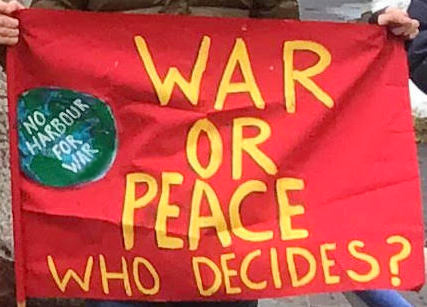 The inability to
predict what comes next is being widely promoted. Various ruling
factions within the political establishment and media are saying the
military was incompetent, unable to predict the speed of the Taliban
takeover, etc. Promoting this high level of uncertainty and
unpredictability is partly to say that the world is unknowable under
the false hope and belief that this will make the people of the U.S.
and other countries and their military and policing agencies line up
with the U.S. military and economic blocs. The inability to
predict what comes next is being widely promoted. Various ruling
factions within the political establishment and media are saying the
military was incompetent, unable to predict the speed of the Taliban
takeover, etc. Promoting this high level of uncertainty and
unpredictability is partly to say that the world is unknowable under
the false hope and belief that this will make the people of the U.S.
and other countries and their military and policing agencies line up
with the U.S. military and economic blocs.
Instead,
the growing demand of the peoples of the world is for the right of the
people to deliberate and decide on issues of war and peace, for an end
to war governments and war economies and for the establishment of
anti-war governments. The peoples of the region, including those of
Vietnam, Japan, Korea and Philippines, with their long experience with
U.S. military bases, occupations and wars, have taken the stand that
the U.S. must close its bases, withdraw its troops and respect the
anti-war stands of the peoples and their demands for relations based on
mutual respect and benefit.

- Nick Lin and Philip Fernandez - 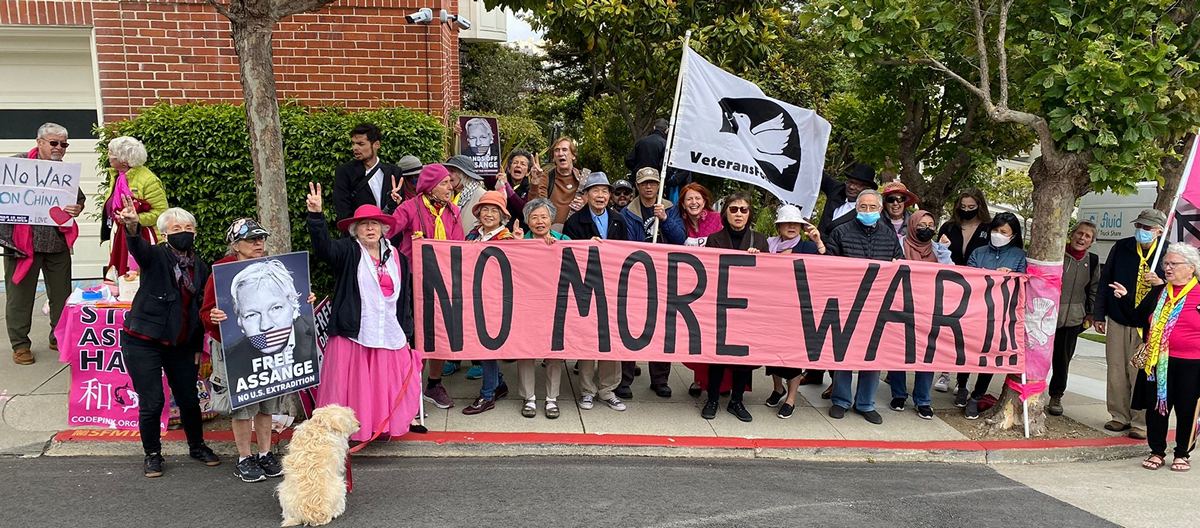
Demonstration in San
Francisco July 22, 2021 demands end to targeting of China.
The U.S. is ramping up its anti-China rhetoric as well as its
military and political efforts to show China and Russia that the U.S.
is top dog, the indispensable nation that sets and interprets its
so-called rules-based international order according to its interests at
any given time, and that it will brook no opposition. To
make this point, U.S. Deputy Secretary of State Wendy Sherman travelled
to China for meetings with Chinese Foreign Minister Wang Yi and other
state officials at the port city of Tianjin in July 2021. Sherman was the
highest ranking U.S. diplomat to visit China after the Biden
administration took power six months earlier. Sherman said that the
U.S. still upholds a one-China policy. Despite this, the U.S. Senate
was passing legislation in support of Taiwan's participation as a
member of the World Health Organization. Chinese
Foreign Minister Wang Yi made it clear China has no intention of living
under a "rules-based international order" where the U.S. makes and acts
as the global enforcer of "the rules." Vice Foreign Minister Xie Feng
said, "the so-called rules-based international order put forward by the
U.S. is a disguise that packages rules set up by a few Western
countries. It is the U.S. version of the 'law of the jungle' where it
abandons the widely accepted international law and tramples on the
international system, so that it can profit and bully others."
According to China, the fundamental reason for the deadlock in
China-U.S. relations is that some in the U.S. portray China as an
"imagined enemy." Minister Wang Yi plainly stated that China is not
seeking hegemony, and is willing to realize common development and
prosperity with all countries, including the United States. He said
that China was one of the founders and has been one of the
beneficiaries of the international order since the Second World War and
that it would work to "safeguard the international system with the
United Nations at its core, uphold the international order underpinned
by international law, and defend the basic norms governing
international relations based on the purposes and principles of the UN
Charter." China put forward three specific demands
to Deputy Secretary of State Sherman to prevent further deterioration
of China-U.S. relations. First the U.S. must not challenge, slander or
attempt to subvert the path and social system the Chinese people have
chosen for themselves. These are matters for the 1.4 billion Chinese
people to decide for themselves, he said. Second, the U.S. must lift
all unilateral sanctions, technology blockades, etc. intended to block
China's development and the right of the Chinese people to
modernization. Third, the U.S. must stop interfering in China's
internal affairs, its sovereignty and territorial integrity. Minister
Wang Yi expressed a commitment from China to find a way for the two
major countries with different systems, cultures and stages of
development to coexist peacefully on this planet through dialogue. He
said it would be even better if it could be mutually beneficial.
 U.S. Deputy
Secretary of State Sherman for her part once again played the U.S.
cards of "human rights" and "western liberal democratic values." She
reiterated President Biden's position holding Beijing responsible for
cyber threats and alleged human rights violations in Xinjiang, Tibet
and Hong Kong and what the U.S. calls actions across the Taiwan Strait
and in the East and South China Seas. U.S. Deputy
Secretary of State Sherman for her part once again played the U.S.
cards of "human rights" and "western liberal democratic values." She
reiterated President Biden's position holding Beijing responsible for
cyber threats and alleged human rights violations in Xinjiang, Tibet
and Hong Kong and what the U.S. calls actions across the Taiwan Strait
and in the East and South China Seas.
Immediately
following Sherman's visit to China, U.S. Secretary of State Antony
Blinken and Pentagon chief Lloyd Austin travelled to India and countries
of Southeast Asia. Their aim was to strengthen military and diplomatic
arrangements aimed at containment of China. While this was going on,
the U.S. again sent a warship through the Taiwan Strait -- the seventh
such provocative transit in the first six months of 2021 -- while
holding a separate military exercise in the South China Sea. At the
same time, the UK Carrier Strike Group's HMS Queen Elizabeth entered
the South China Sea proclaiming its intent to challenge China's
territorial waters in defence of "freedom of navigation." Speaking
at the Office of the Director of National Intelligence on July 27,
President Joe Biden used the matter of cyber security to say war is a
real possibility. Without directly naming China he said, "I can't
guarantee this, and you're as informed as I am, but I think it's more
likely we're going to end up -- well, if we end up in a war, a real
shooting war with a major power, it's going to be as a consequence of a
cyber breach of great consequence." The question
immediately arose of Biden's aim in speaking in this manner. Discussion
is usually considered to be talking or writing about something, in
order to solve a problem or resolve a question. When the President of
the United States can so cavalierly say he sees "a real shooting war
with a major power" down the road, and top U.S. diplomats keep
repeating that the whole world is to be governed by "our values," that
is not discussion. It is the U.S. asserting itself as the indispensable
power and arbiter of an international order based on its own rules.
China, as is also the case with Russia, is having none of it.

(To access articles
individually click on the black headline.)
PDF
PREVIOUS ISSUES
| HOME
Website: www.cpcml.ca
Email: editor@cpcml.ca
|


 Fully
18 of 26 priorities Joly is instructed to act on are explicitly or
implicitly associated with longstanding U.S. foreign policy objectives
and projects in furtherance of its aim of global dominance, with
"multinational" entities like NATO, the G7 and a bevy of coalitions,
institutes, foundations, NGOs and the like as tools for this. Some of
the interfering "democracy promotion" outfits Canada has committed to
lead and fund in the coming year were spelled out in the Trudeau
government's submission to Biden’s Summit for Democracy in
December.
Fully
18 of 26 priorities Joly is instructed to act on are explicitly or
implicitly associated with longstanding U.S. foreign policy objectives
and projects in furtherance of its aim of global dominance, with
"multinational" entities like NATO, the G7 and a bevy of coalitions,
institutes, foundations, NGOs and the like as tools for this. Some of
the interfering "democracy promotion" outfits Canada has committed to
lead and fund in the coming year were spelled out in the Trudeau
government's submission to Biden’s Summit for Democracy in
December. What
is unmistakable in considering the foreign minister's mandate letter is
that Canadians have no say in deciding what role their country should
play in the world. All matters of Canada's foreign policy remain the
purview of an executive operating behind closed doors and away from
Parliament, at the beck and call of the U.S. and supranational bodies
ruled by narrow private interests. None of what the letter pertains to
was raised by the Liberals, any of the other cartel parties in the
Parliament or the monopoly media during the election campaign, which
was notably devoid of any discussion on foreign policy whatsoever
except that raised by the Marxist-Leninist Party of Canada and other
small parties.
What
is unmistakable in considering the foreign minister's mandate letter is
that Canadians have no say in deciding what role their country should
play in the world. All matters of Canada's foreign policy remain the
purview of an executive operating behind closed doors and away from
Parliament, at the beck and call of the U.S. and supranational bodies
ruled by narrow private interests. None of what the letter pertains to
was raised by the Liberals, any of the other cartel parties in the
Parliament or the monopoly media during the election campaign, which
was notably devoid of any discussion on foreign policy whatsoever
except that raised by the Marxist-Leninist Party of Canada and other
small parties. 



 The U.S. controls
and uses the World Bank and Asian Development Bank, the International
Monetary Fund, the Bank for International Settlements and SWIFT system,
credit cards and the U.S. dollar as weapons to dominate others and
ensure its global hegemony.[
The U.S. controls
and uses the World Bank and Asian Development Bank, the International
Monetary Fund, the Bank for International Settlements and SWIFT system,
credit cards and the U.S. dollar as weapons to dominate others and
ensure its global hegemony.[
 Diesen details
the rising opposition to the U.S.-controlled development banks and
other lending institutions writing, "The U.S.-led IMF, World Bank and
Asian Development Bank are renowned instruments of U.S. economic
statecraft. The launch of the Chinese-led Asian Infrastructure
Investment Bank (AIIB) in 2015 became a watershed moment in the global
financial architecture, as all the major allies of the U.S. (except
Japan) signed up in defiance of American warnings. The New Development
Bank, formerly referred to as the BRICS Development Bank, was a further
step towards decoupling from the U.S.-led development banks. The
Eurasian Development Bank and future SCO Development Bank are more
nails in the coffin of U.S.-controlled development banks."
Diesen details
the rising opposition to the U.S.-controlled development banks and
other lending institutions writing, "The U.S.-led IMF, World Bank and
Asian Development Bank are renowned instruments of U.S. economic
statecraft. The launch of the Chinese-led Asian Infrastructure
Investment Bank (AIIB) in 2015 became a watershed moment in the global
financial architecture, as all the major allies of the U.S. (except
Japan) signed up in defiance of American warnings. The New Development
Bank, formerly referred to as the BRICS Development Bank, was a further
step towards decoupling from the U.S.-led development banks. The
Eurasian Development Bank and future SCO Development Bank are more
nails in the coffin of U.S.-controlled development banks."
 Stopping in
Singapore first, Harris met with Singaporean President Halimah Yacob and
Prime Minister Lee Hsien Loong. She made a point of visiting the
warship USS
Stopping in
Singapore first, Harris met with Singaporean President Halimah Yacob and
Prime Minister Lee Hsien Loong. She made a point of visiting the
warship USS  The inability to
predict what comes next is being widely promoted. Various ruling
factions within the political establishment and media are saying the
military was incompetent, unable to predict the speed of the Taliban
takeover, etc. Promoting this high level of uncertainty and
unpredictability is partly to say that the world is unknowable under
the false hope and belief that this will make the people of the U.S.
and other countries and their military and policing agencies line up
with the U.S. military and economic blocs.
The inability to
predict what comes next is being widely promoted. Various ruling
factions within the political establishment and media are saying the
military was incompetent, unable to predict the speed of the Taliban
takeover, etc. Promoting this high level of uncertainty and
unpredictability is partly to say that the world is unknowable under
the false hope and belief that this will make the people of the U.S.
and other countries and their military and policing agencies line up
with the U.S. military and economic blocs.
 U.S. Deputy
Secretary of State Sherman for her part once again played the U.S.
cards of "human rights" and "western liberal democratic values." She
reiterated President Biden's position holding Beijing responsible for
cyber threats and alleged human rights violations in Xinjiang, Tibet
and Hong Kong and what the U.S. calls actions across the Taiwan Strait
and in the East and South China Seas.
U.S. Deputy
Secretary of State Sherman for her part once again played the U.S.
cards of "human rights" and "western liberal democratic values." She
reiterated President Biden's position holding Beijing responsible for
cyber threats and alleged human rights violations in Xinjiang, Tibet
and Hong Kong and what the U.S. calls actions across the Taiwan Strait
and in the East and South China Seas.